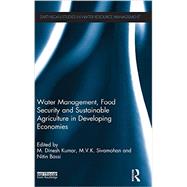- ISBN: 9780415624077 | 041562407X
- Cover: Hardcover
- Copyright: 10/1/2012
This book addresses strategies for food security and sustainable agriculture in India, a fast developing economy, whose natural resource base comprising land and water supporting agricultural production are not only under enormous stress, but also complex and not amenable to a uniform strategy. It critically reviews issues which continue to dominate the debate on water management for agricultural and food production. First of all, it examines the validity of the claim that large water resources projects cause serious social and environmental damages using global and national datasets. It then explores the potential of these systems for tackling groundwater mining, sustaining well irrigation and reducing the energy footprint of irrigated agriculture through return flow recharge in the command areas. The authors examine claims that the future of Indian agriculture is in rain-fed farming supported by small water harvesting. They question whether water-abundant eastern India could become the granary of India, through a groundwater revolution with the right policy inputs. In the process, they examine the less researched aspect of the food security challenge, which is land scarcity in eastern India. The book also looks at the reasons for the limited success in bringing about the much needed institutional reforms in canal irrigation for securing higher productivity and equity using case studies of Gujarat, MP and Maharashtra. Finally it addresses how other countries with similar economies might learn from the case study of India.







